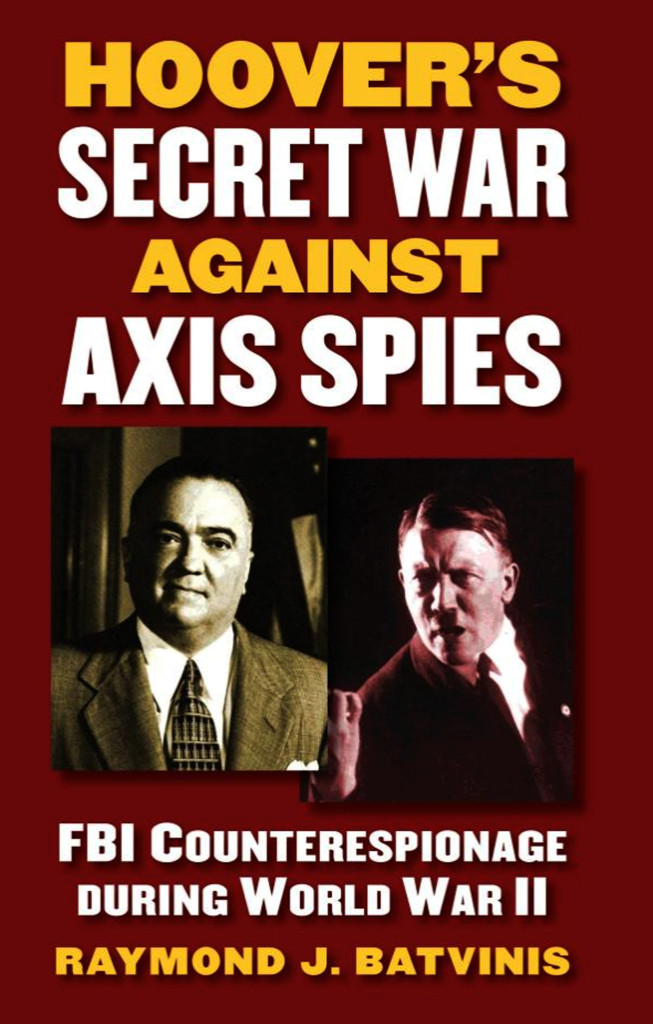 My book was reviewed today in the Washington Times newspaper:
My book was reviewed today in the Washington Times newspaper:
BOOK REVIEW: ‘Hoover’s Secret War Against Axis Spies’
By Joseph Goulden
Washington Times
May 27, 2014
HOOVER’S SECRET WAR AGAINST AXIS SPIES: FBI COUNTERESPIONAGE DURING WORLD WAR II
By Raymond J. Batvinis
University Press of Kansas, $34.95, 334 pages
An oft-told story in the annals of intelligence is that of the rivalry of the FBI’s J. Edgar Hoover with William Donovan of the Office of Strategic Services over which agency should have wartime primacy in the fight against the Axis powers.
However, an overlooked principal in the fight was none other than MI6, the British Secret Intelligence Service.
As retired FBI executive Raymond Batvinis relates in engrossing detail, the Brits chose to align themselves with Donovan, realizing that he had considerably more clout with President Roosevelt than did Hoover.
Indeed, in the pre-war years, the British were bold enough to set up their own shadow intelligence service in the United States, British Security Coordination, whose functions paralleled those of the FBI in many respects.
To the British, the FBI was a police agency, interested in imprisoning spies rather than using them to feed disinformation back to Berlin, as did MI6.
In due course, peace was made. The OSS emerged with prime responsibility for foreign intelligence, but the FBI had an overseas presence through agents posted to American embassies as “legal attaches.”
Drawing upon previously classified documents, Mr. Batvinis describes how the FBI joined with MI6 in the so-called “Double Cross” operation to funnel false information back to the enemy through agents who were caught and “turned.”
The bureau’s target audience was Japan, which was fed a flood of bogus “information” on subjects ranging from the growth of U.S. military prowess to intended invasion targets. I had not encountered a full description of the bureau’s work on “Double Cross” until Mr. Batvinis’ book.
Another FBI coup, according to Mr. Batvinis, was the “chilling revelation,” detected in December 1941, about German eagerness for information concerning American atomic research. FBI intelligence led to Roosevelt’s decision to fund the development of nuclear weaponry.
The FBI managed to con the Germans into sending vast sums to agents who had been doubled into working for the Allies. (The agents would claim that they could not spy and hold a job at the same time.) One of them alone received $46,875 over a two-year period — more than $612,000 in 2012 dollars.
Another deception swallowed by the Germans was the creation of bogus subagents who supposedly had access to information sought by Berlin.
These notional sources were essential to convincing Berlin that the prime agent had access to multiple sources — including a War Department employee and workers in such places at the Brooklyn Navy Yard and Republic Aviation Co.
For communications, the FBI set up a transmitter in a rambling farmhouse in a remote area on the north shore of Long Island. A “large snarling dog” discouraged visits from curious locals.
Mr. Batvinis’ book is a splendid account of the FBI’s contribution to victory in World War II. Five cloaks, five daggers.
Joseph C. Goulden is the author of 18 nonfiction books.
You must be logged in to post a comment.